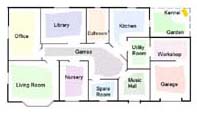
|
|||
|
|||

|
|||
|
|||
Hints and Things does not use any 1st Party cookies - more information .
Home Office Security in 6 Easy Stepsby Lloyd Burrell of www.officedeskreviews.com Whether you work in an office building or work out of a home office, security is of great importance to you and your clients, be it threat of hardware or information theft. To counter these dangers, which are all too real, home office security should be as tight as any big building, sans the security guard making regular sweeps of the premise (though this could be accomplished with a trained watch dog, and not a bad idea). The following are six ideas to help towards basic but essential home office security.1. Be Prepared Against Family Interference
Alternatively, you could install a site-lock option, to make certain specific websites are not allowed navigation. Of course, there is the ability to lock away the computer tower in a storage cabinet, which some nicer desks provide, or simply place the tower out of reach of children. 2. Physical Security of Client InformationDespite the fact that computers were supposed to end the need for a paper trail, very few keep both hard and soft copies of their information.To protect the hard copies such as files and important papers, keep a fireproof safe on premises at all times, and use it. It would be wise, too, to install a security alarm able to warn against break-in, fires, water damage, and the like. Your home, as well as your office, deserves this protection. 3. Cyber Security of Client Information
Also always have a firewall in place, and hint, the one that comes with your system is probably not enough. There are fantastic free firewalls available for download, or a paid -for security suite should provide an excellent one, as well. Most will automatically scan email attachments for viruses, but never open an attachment from an address or name you don’t recognize, and if you do, never ever download an executable (.exe) file. 4. Data BackupVery important, make sure you back up your data regularly using either an integrated back up feature in your own operating system, or back it up to disc or DVD, or use an external hard drive. Even the thumb drives or flash drives today can be bought large enough to hold this data.If you have RAID capability with your computer, it is suggested to enable it, meaning you will have a dual (or more) hard drive system where the slave drive can automatically mirror the master drive and protect against single drive failure. It also speeds up processes, protects against initial data loss, and offers real-time data recovery with uninterrupted access when the primary hard drive fails. Data is very safe when RAID devices are enabled. 5. WiFi Network SecurityNext to the invention of pockets; Wifi may well be mankind’s greatest boon, allowing for computer placement anywhere and convenience of movement. However, the network system, if left open and unprotected, can allow for leeches to use your network for free and does not offer encrypted protection, so the canny infringer can simply and literally steal information out of the air.All WiFi systems come with the ability to enable password protection and need to be WPA encrypted immediately, which can be done by the consumer or an ISP technician. 6. Home Premises ProtectionAside from the possible guard dog and intruder alarms, it is important to make your home premises look uninviting to the curious trespasser.Automatic motion sensor lights are an excellent method, as are ‘security cameras’, the kind bought for under ten dollars each whereupon the buyer installs them at a corner of the house. These ingenuous devices are not connected to any real monitors, but they sweep side to side as though genuinely recording and provide an economical option for the appearance of ultra-tight security.
Information on PC 'Fine' Scam issued by Trading Standards.
Copyright © 2000-2020 Hints and Things cannot be held responsible for any information given on this site nor do they necessarily agree with, or endorse, the views given by third parties. |